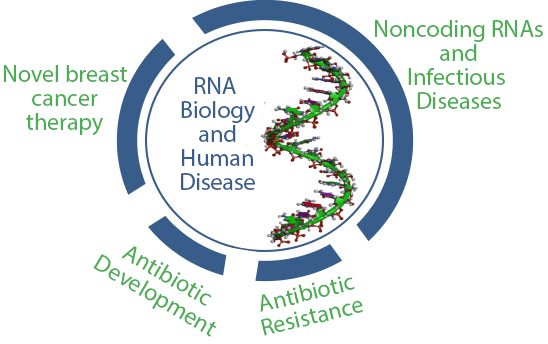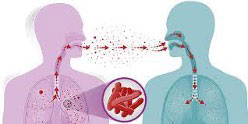Research

Non-coding RNAs and sORFs in cancer and other human diseases
We study how tRNAs, sORFs and other ncRNAs influence cellular physiology. At the molecular level, these changes are implicated in many important processes such as stress resistance, cell survival, apoptosis, cell signaling, RNAi, and protein synthesis. Manifestation of these changes is implicated in several human diseases including cancer and neurodegenerative diseases such as Amyotrophic Lateral Sclerosis (ALS/Lou Gehrig’s disease) and Parkinson’s Disease. tRNAs, sORFs and other ncRNAs and can also accelerate the virulence of bacterial pathogens and viruses.
Our laboratory uses state-of-the-art, genome-scale methods such as a specialized RNA-seq method coupled with Ribo-seq to identify which RNAs are altered in conditions that mimic diseases. We complement these approaches with other genome-wide methods such as proteomics, metabolomics, and bioinformatics to pinpoint how the RNAs reprogram cells to cause disease.

ncRNA-based treatments for breast cancer
Breast cancer is the second leading cause of cancer deaths in women. Although death rates have been gradually decreasing for women over 50, they remain steady for those under 50 because many in in all breast cancers. this group have triple-negative breast cancer (TNBC). TNBC cells lack estrogen and progesterone receptors and have low levels of the HER2 receptor. TNBC grows and spreads faster compared to other types of invasive breast cancer. Since treatment options are limited because hormone therapy and other targeted drugs are ineffective, the prognosis for TNBC patients is also worse.
Overall, treatment options for all breast cancers could be enhanced by discovery of new, more focused therapeutic targets and better biomarkers for predicting outcomes. We have a new grant (Fall 2021) from the National Cancer Institute at NIH in collaboration with Dr. Yuh-Hwa Wang at the University of Virginia School of Medicine for development of an innovative treatment approach that enlists ncRNAs to enhance survival in all breast cancers.

How ncRNAs subvert antibiotic effacacy against bacterial pathogens that plague cystic fibrosis patients
Cystic fibrosis (CF) patients are at high risk for acquiring chronic bacterial lung infections that can lead to progressive lung damage and respiratory failure. Antimicrobial treatment for these bacterial pathogens often has a high failure rate even after 1-2 year treatment regimens. Some of these infections are so intractable in CF patients that they require a lung transplant or experimental bacteriophage therapy in an attempt to save lives.
We are studying why antibiotic treatment of life-threatening lung infections caused by these opportunistic bacterial pathogens so often fails in CF patients and other immune compromised individuals. Studying the mechanisms of antimicrobial resistance in these bacterial pathogens should enable the development of better biomarkers to predict the tenacity of these lung infections and enable more informed selection of more effective treatment options using available antibiotics.

How ncRNAs influence pathogenesis — tuberculosis as a case study
Approximately 20% of the global population is infected with Mycobacterium tuberculosis, the bacterial pathogen that causes tuberculosis (TB). In fact, TB still devastates the developing world. It is projected that TB is once again the #1 killer by a single infectious agent as COVID-19 mortality has diminished.
M. tuberculosis has evolved to evade being killed by our immune system and antibiotics. We are studying the molecular switches, often in ncRNAs and sORFs, that trigger the changes in M. tuberculosis physiology that facilitate immune evasion and antibiotic survival. This work is performed in collaboration with the physician-scientist Dr. Robert Husson at Boston Children’s Hospital/Harvard Medical School and provides a framework for the design of new and improved therapeutics to more rapidly clear TB infections.
